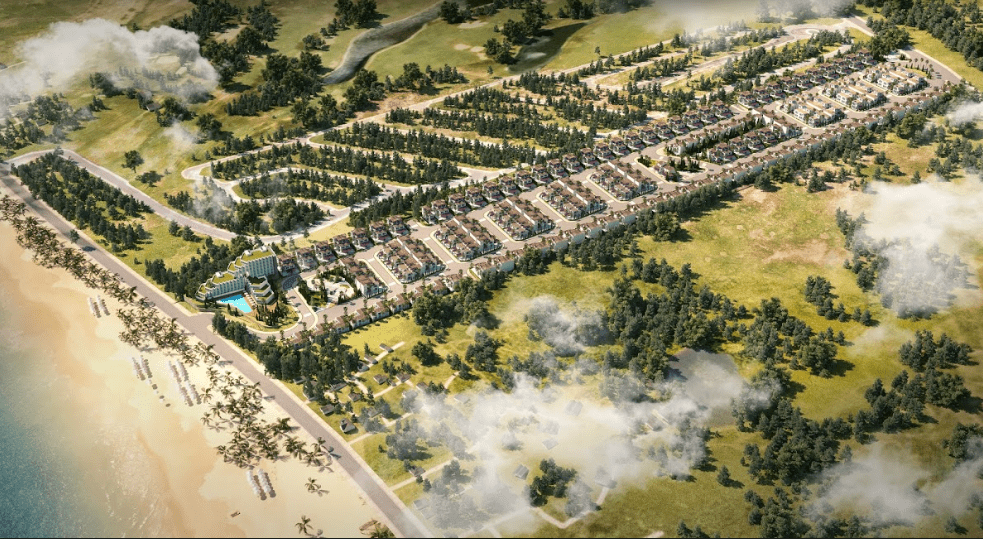Resort real estate is not a new type of real estate in the world anymore, it has been developed for a long time. But in Vietnam, this type has only blossomed in the past few years and attracted a lot of attention from investors because of its novelty as well as the profits it brings.
Why invest in resort real estate?
In the past 5 years, resort real estate, especially coastal resorts, has gradually become dominant and received great attention from investors.
Instead of investing in apartment and townhouse projects, businesses have begun to shift to resort real estate business in typical tourist areas such as Phu Quoc, Phan Thiet, Da Nang, etc.

So why is there this shift? Firstly: The target audience of resort real estate projects are mostly people with high income, idle capital and not in a hurry. Resort products are often quite expensive and only promote liquidity at an average time of about 5 years, when the project has begun to be recognized as a brand and operates stably.
Therefore, to make immediate profits, the project location and services must be truly attractive enough to attract target customers. Although the "capital incubation" period is quite long, in return, the profit from investing in resort real estate once it is in motion is always stable over a long period of time.
Highest profit margin
When investing in any field, the investor's primary concern is always the rate of return. No one invests in something that does not bring a rate of return, that is obvious.
And among the fields with high to very high profit margins, real estate or resort real estate, more specifically resort villas, is the investment channel that brings the highest profit margin.
With a stable investment environment, resort real estate can bring in a profit margin of 10% – 15% / year. In terms of profit margin, if townhouses and apartments are 3% – 6%, offices for rent are 5% – 10%, then resort villas are 10% – 16% / year.
Opportunities from coastal land fund
As resort villas, of course, they are always located in prime locations for tourism, transportation, infrastructure, and own private beaches of that resort project. When implementing the project, the investor also carefully calculated the economic development opportunities of the project, the rate of tourists here, the room occupancy rate during operation, etc. These are opportunities that not all real estate has from the beginning. These conditions create a very good profit potential when operating resort villas here.
Resort real estate is a very good channel to keep money
Resort real estate or villas are a good way to keep money for investors, especially investors with a long-term investment vision. Famous investors in the industry all agree with the point of view: If you want to keep your money the safest, put it in the bank, but if you want to keep your money both safe and with extremely high profits, you should buy a villa.
Resort real estate is not only an investment, it is also a second home. Above all, customers who invest in buying villas or resort apartments are a group of customers who have large savings, and their outstanding desire is not only money. Besides interest rates, owning a resort villa for yourself is one of the most wonderful things.

Possible risks
Liquidity risk
In fact, the investment in resort villas has lower liquidity than other investment types such as townhouses, apartments, and land. It is more suitable for long-term investment, "the goose that lays the golden eggs", rather than for short-term investment. Therefore, investors need to clearly define their investment goals from the beginning.
Risks from the regional and world economic situation
The decline in international tourist arrivals and the simultaneous decrease in remittances have caused the Vietnamese tourism and real estate markets to stagnate and become less prosperous. Meanwhile, these are the two major markets that determine the revenue from beach villa rentals and the value of beach villas.
According to experts, Vietnam only partially opens up to integration, while the rest is still regulated by the state, which can help Vietnam avoid major recessions. And in the next 20 years, Vietnam will not be able to fully integrate, and the economy still needs self-regulation by the state. This is a fairly safe signal for those who want to invest in the Vietnamese real estate market.
Above are some of the assessments of the potentials and risks that may be encountered when investing in the resort real estate market that AHS would like to send to investors. You can refer to some other articles of AHS.







